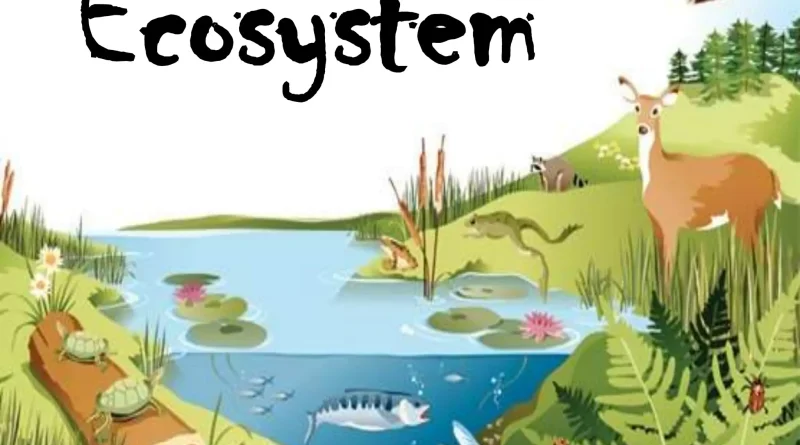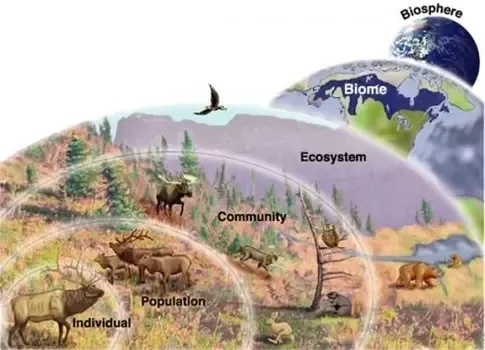Understanding Ecosystems
Introduction
Ecosystems are remarkable natural phenomena that are intricately and finely balanced within the enormous tapestry of our globe. Ecosystems, which can range from lush rainforests to parched deserts, are essential to preserving ecological balance. This piece explores the fascinating realm of ecosystems, examining their elements, roles, and significant influence on the condition of our planet.
The Essence of Ecosystems
A group of living things interacting with their physical surroundings and one another is the most basic definition of an ecosystem. A delicate equilibrium that supports life and affects the climate is created by this interplay. A tiny pond or a massive rainforest are examples of different ecosystems that illustrate the diversity of life on Earth.
The Biodiversity Quotient
A term that is frequently used in relation to ecosystems, biodiversity describes the variety of life in a specific habitat. The current state of affairs brings to light a developing worry: the extinction of biodiversity. Many species’ declines are caused by human actions like pollution and deforestation. Ecosystem preservation depends on our ability to comprehend this dilemma, which puts the delicate web of life in danger.
The Impact of Climate Change
In the year 2023, the effects of climate change are palpable in ecosystems around the globe. Rising temperatures, extreme weather events, and shifting precipitation patterns are altering the dynamics of these intricate networks. From the Arctic tundra to the coral reefs, ecosystems are facing unprecedented challenges. This shift necessitates a closer look at adaptation strategies and the role of ecosystems in mitigating climate change.
Adapting or Perishing
Like every other living thing, ecosystems need to adapt in order to live. The resilience of the entire ecosystem depends on species’ capacity to adapt to changing conditions. Analysing case studies from various locations offers insights into the coping mechanisms nature uses to adapt to changing climate conditions.
Human Impact on Ecosystems
As the dominant species on Earth, humans wield significant influence over ecosystems. The technological advancements of the 21st century have brought both benefits and drawbacks. Urbanization, industrialization, and agricultural expansion have altered landscapes and put immense pressure on natural habitats. Understanding the consequences of these activities is essential for devising sustainable practices that coexist harmoniously with ecosystems.
The Role of Conservation
Conservation efforts have gained momentum in response to the escalating threats to ecosystems. Governments, non-profit organizations, and individuals are collaborating to preserve biodiversity and protect endangered species. However, the challenges are immense, and a comprehensive approach involving policy changes, education, and community engagement is necessary for effective conservation.
The Technological Frontier
Despite these difficulties, technology manifests as a two-edged blade. On the one hand, technological advancements like artificial intelligence and satellite monitoring help us better comprehend ecosystems. However, technology can also contribute to the deterioration of the environment. In the contemporary ecosystem narrative, striking a balance between ecological protection and technological advancement is crucial.
Digital Solutions for Conservation
The digital era brings forth innovative solutions for ecosystem conservation. Drones equipped with sensors monitor wildlife and detect illegal activities in protected areas. Machine learning algorithms analyze vast datasets to identify patterns and predict potential threats to ecosystems. The fusion of technology and conservation efforts opens new avenues for safeguarding the natural world.
Ecosystem Services: The Unseen Contributors
Ecosystems provide a myriad of services that are often taken for granted. Clean air, fresh water, and fertile soil are among the many benefits that ecosystems offer to humanity. Recognizing and valuing these services is crucial for sustainable resource management and the well-being of future generations.
The Economics of Ecosystems
In a world driven by economic considerations, the value of ecosystems extends beyond the ecological realm. The concept of “ecosystem services” has gained traction, emphasizing the economic benefits derived from nature. From pollination of crops to water purification, these services contribute to the global economy. Integrating this understanding into economic policies is imperative for a holistic approach to development.
The Road Ahead: Balancing Act for a Sustainable Future
As we stand at the crossroads of environmental challenges and technological advancements, the path forward requires a delicate balance. The restoration of ecosystems, coupled with sustainable practices, is essential for mitigating the impacts of climate change and preserving biodiversity.
Education as a Catalyst
One of the most important things we can do to promote a conservation culture is to educate the public about the value of ecosystems. People with more knowledge are more likely to make sustainable decisions in their daily lives, which can have an impact on the attitudes and behaviours of a larger society.
Policy Reforms for Ecosystem Resilience
Governments worldwide must enact policies that prioritize ecosystem conservation and sustainable practices. From stringent regulations on deforestation to incentives for green technologies, policy reforms play a central role in shaping the future of ecosystems.
International Collaboration: A Global Endeavor
Ecosystems transcend borders, and their preservation requires global collaboration. International agreements and partnerships are essential for addressing transboundary issues, such as deforestation, climate change, and the illegal wildlife trade. The collective efforts of nations can create a formidable front against the challenges faced by ecosystems.
Conclusion
Ecosystems are the threads that connect the various strands of life on Earth to form the fabric of existence. Our relationship with nature needs to be reevaluated in light of the current circumstances, which call for us to shift from being exploiters to stewards. Through adoption of sustainable practises, utilisation of technical advancements, and promotion of a worldwide dedication to conservation, we may effectively navigate the dynamic terrain and guarantee a peaceful coexistence with the ecosystems that support our existence. The understanding, appreciation, and proactive attempts to protect the complex web of life that defines our planet are the first steps towards a sustainable future.

